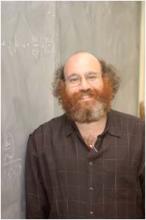 Theoretical physics is the search for a mathematical description of the world around us. For centuries, simplicity and elegance have been guiding principles in this search-time and again we have seen that the world is simpler than it could have been, and that complex phenomena can be captured by a small set of ideas whose mathematical formulation provides startlingly successful predictions of things waiting to be discovered. Despite these successes, many everyday things have eluded our grasp. Most obvious are the phenomena of life: from the decisions made by bacteria as they adapt to different environments to our own perceptions and memories, we have a whole universe of beautiful phenomena untamed by theory. Can we imagine a theoretical physics of biological systems? Can we reconcile the physicists' desire for unification with the obvious diversity of life's mechanisms? Could such theories engage meaningfully with the myriad details of particular systems, yet still be derivable from succinct and abstract principles that transcend these details? I am an optimist, and I think the answers to these questions are "yes," but they still keep me awake at night. In this talk I will try to convey my reasons for optimism, discussing a series of examples where I think we can see glimpses of more general principles. Along the way we'll look at problems ranging from the development of an embryo to the flocking of birds, with many stops in between.
Theoretical physics is the search for a mathematical description of the world around us. For centuries, simplicity and elegance have been guiding principles in this search-time and again we have seen that the world is simpler than it could have been, and that complex phenomena can be captured by a small set of ideas whose mathematical formulation provides startlingly successful predictions of things waiting to be discovered. Despite these successes, many everyday things have eluded our grasp. Most obvious are the phenomena of life: from the decisions made by bacteria as they adapt to different environments to our own perceptions and memories, we have a whole universe of beautiful phenomena untamed by theory. Can we imagine a theoretical physics of biological systems? Can we reconcile the physicists' desire for unification with the obvious diversity of life's mechanisms? Could such theories engage meaningfully with the myriad details of particular systems, yet still be derivable from succinct and abstract principles that transcend these details? I am an optimist, and I think the answers to these questions are "yes," but they still keep me awake at night. In this talk I will try to convey my reasons for optimism, discussing a series of examples where I think we can see glimpses of more general principles. Along the way we'll look at problems ranging from the development of an embryo to the flocking of birds, with many stops in between.

